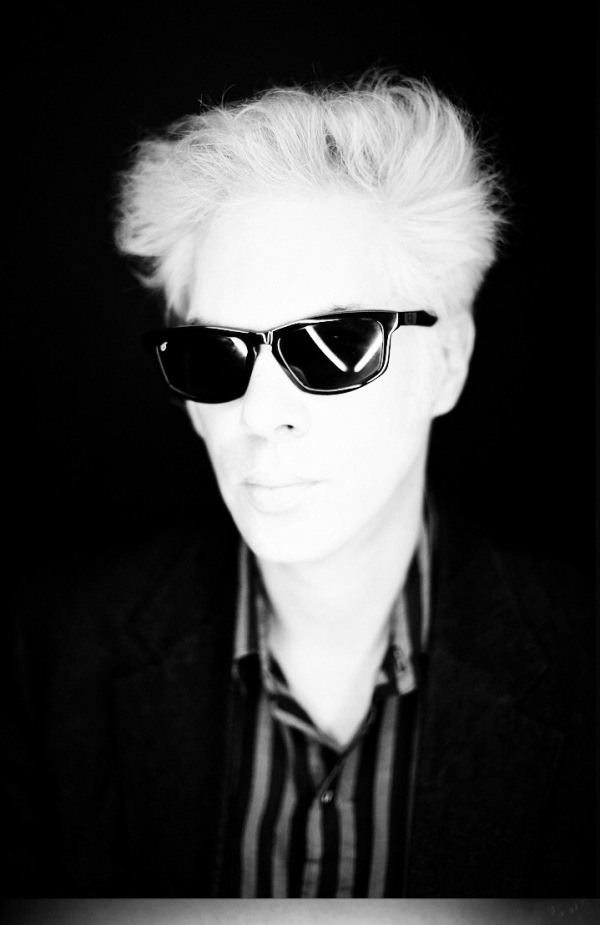![]() BY DAN TABOR FILM CRITIC Jim Jarmusch emerged on the American independent film scene in 1980 with his feature length debut Permanent Vacation, written and directed shortly after he dropped out of film school. The film would establish the director’s M.O. going forward: an eccentric cast of hipster characters who inhabit an almost otherworldly, super cool version of New York city. Jarmusch also displayed his musical chops composing the soundtrack for Vacation, that has over time evolved into a side hustle for the director who continues to perform and record with his experimental noise band, SQURL. His next film, 1984’s Stranger Than Paradise, would cement his rep as a hipster auteur with a flair for understatement and win him the prestigious Caméra d’Or at the Cannes Film Festival. Since then he has gone on to make modern indie classics like Dead Man, Ghost Dog: Way of the Samurai, Coffee and Cigarettes, and 2005’s Broken Flowers, starring Bill Murray, which earned him the Grand Prix at Cannes. In the last 30-plus years, Jim Jarmusch has built a filmography made of counterculture staples.
BY DAN TABOR FILM CRITIC Jim Jarmusch emerged on the American independent film scene in 1980 with his feature length debut Permanent Vacation, written and directed shortly after he dropped out of film school. The film would establish the director’s M.O. going forward: an eccentric cast of hipster characters who inhabit an almost otherworldly, super cool version of New York city. Jarmusch also displayed his musical chops composing the soundtrack for Vacation, that has over time evolved into a side hustle for the director who continues to perform and record with his experimental noise band, SQURL. His next film, 1984’s Stranger Than Paradise, would cement his rep as a hipster auteur with a flair for understatement and win him the prestigious Caméra d’Or at the Cannes Film Festival. Since then he has gone on to make modern indie classics like Dead Man, Ghost Dog: Way of the Samurai, Coffee and Cigarettes, and 2005’s Broken Flowers, starring Bill Murray, which earned him the Grand Prix at Cannes. In the last 30-plus years, Jim Jarmusch has built a filmography made of counterculture staples.
So suffice it to say it was a surreal experience to sit down and interview Jarmusch about his latest film The Dead Don’t Die a couple weeks back. To make this occasion even more serendipitous, the film in question is a zombie comedy starring three of my favorite actors: Adam Driver, Bill Murray and Chloë Sevigny. Still, given some of the buzz around the film from Cannes, I was a bit worried that the film would be more of an ironic piece that talks down to horror genre fans with an ironic and swarmy hipper-than-thou take. Instead, The Dead Don’t Die is a humorous love letter to all things undead filled to the brim with meta-references and call backs to the postmodern zombie film genre.
It’s a rare thing when the people whose work you’ve long admired from afar turn out to be damn cool in person. But clad head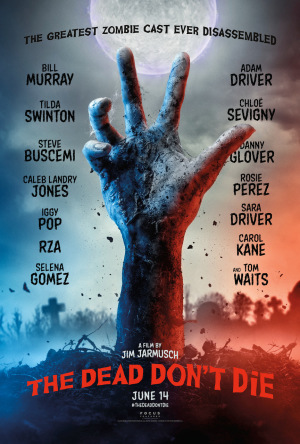 to toe in black denim and his trademark dark sunglasses beneath a thick white cloud of hair, Jarmusch was filled with a Zen-like calm, as he professed not only his love for Night Of The Living Dead director George Romero, but the horror genre in general. Thoughtful and extremely candid, Jarmusch and I had an extremely comprehensive chat about a film that is a rather bleak statement on climate change and the generation being left to deal with it. To be clear, The Dead Don’t Die is one of my favorite movies of 2019.
to toe in black denim and his trademark dark sunglasses beneath a thick white cloud of hair, Jarmusch was filled with a Zen-like calm, as he professed not only his love for Night Of The Living Dead director George Romero, but the horror genre in general. Thoughtful and extremely candid, Jarmusch and I had an extremely comprehensive chat about a film that is a rather bleak statement on climate change and the generation being left to deal with it. To be clear, The Dead Don’t Die is one of my favorite movies of 2019.
PHAWKER: So first off, you’ve done a Samurai film, a vampire film. Why zombie film?
JIM JARMUSCH: And a western, and a very abstract hitman film. You know, zombies are the broadest kind of metaphor possible. And I guess that attracted me because I wanted the film to be ridiculous, and a little dark at the same time. So, zombies seemed like the kind of ideal metaphor, you know, the broadest metaphor possible for the times we live in. So yeah, I chose zombies.
PHAWKER: There’s an obvious love for the genre here at work, especially George Romero films. I mean, there’s like countless George Romero calls, which I loved. What was your initiation to the zombie genre?
JIM JARMUSCH: Oh Gosh. I don’t know, because I saw a lot of horror films when I was a kid because my mom would drop me off in Akron on Saturdays at this double feature movie theater. So I must have seen something there. You know, White Zombie, I remember, I remember I Walked With A Zombie, that’s not really a zombie film at all. Um, but I gotta say I’m not a big zombie fan. I’m a more of vampire fan, but I’ve seen a lot of zombie films. I’ve never seen The Walking Dead or stuff like that, but I’ve seen a lot of zombie stuff, but it’s Romero, because Romero is the postmodern zombie master. He changed everything. The metaphor became, so powerful.
PHAWKER: Yes with him imbuing the film with the struggle with race and the civil rights movement of the time.
JIM JARMUSCH: Yeah. And also, you know, before that early zombies are entities like Voodoo-controlled to do your bidding. Romero makes them us. They are also monsters that come from within a decaying social order, not from without. They’re not Godzilla. You know, they are the monsters, but they’re the victims too because they don’t choose to be reanimated. It’s some stupid things humans did, you know? So, wow. He really made it really fascinating, very powerful. I love Night of the Living Dead and his other films too, I liked Day of the Dead, I liked Martin and The Crazies; but Night of the Living Dead is the godmother of our film for sure. We were shooting it 50 years later and his metaphor, it’s the same, you know, it’s just the same. So, when people say ‘why didn’t he bring anything new to the social consciousness of the film.” Did we need to, isn’t it obvious?
PHAWKER: I tend to disagree with some of those folks but I’ll get to that later. But I disagree with some what some people were saying because I just don’t think they looked deep enough into your film because it has multiple layers. One thing I’m always fascinated with, in zombie films in particular, is rules. Like you’re zombies are definitely unique to your sort of universe you’ve created. How did you come up with the dust that comes out when you dismember them instead of blood? Because I thought that was fascinating and I noticed how the people that had been dead longer had black 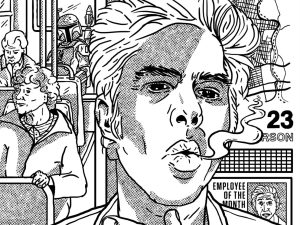 dust and the people who weren’t dead that long had green dust. And the talking as well. Like how did you come up with adding that as well to your zombies?
dust and the people who weren’t dead that long had green dust. And the talking as well. Like how did you come up with adding that as well to your zombies?
JIM JARMUSCH: The talking is just from Romero, from Day of the Dead.
PHAWKER: Yeah Bud the zombie.
JIM JARMUSCH: But the dust was, while I was writing the script, I took a walk and I was thinking about how I didn’t want to make a splatter movie, right? Then I was walking and I was thinking about the fact that we are what, 70% water? And our brains and lungs even more. I’m walking and I’m thinking, “Oh wow man, I’m just like a cross between a water balloon and a fucking sausage,’ you know, it was just kinda weird. And then I was thinking, okay, and if you’re dead for a long time, man, you have no fluids. You’re dry, you’re dust. So then we have ashes to ashes, dust to dust, right? So I thought I had that could be visually nice to have them just turn to dust.
PHAWKER: Yeah and when I thought about that, it totally makes sense to me because they embalm you and your body would probably eventually dry out. But we have these movies where, you know, there’s blood and gore everywhere.
JIM JARMUSCH: Yeah. So, you know, I also liked it visually.
PHAWKER: It was definitely a different take on zombies and it really makes them your own.
JIM JARMUSCH: Yeah and they are cannibals, not purely brain eaters, like some zombies, they are cannibalistic and ‘Kill the Head’ of course comes from other things from, well from Romero.
PHAWKER: I loved the repetitive gags like Kill the Head and the theme song gag. There were a couple of lines that I just can’t wait for more people to see it so they make their way into the pop culture hive mind.
JIM JARMUSCH: Yeah. My partner Sarah Driver, she thinks that repetitive humor is appealing only to children and men.
PHAWKER: (Laughs) Yeah, I can see that.
JIM JARMUSCH: I don’t know if she’s right or not. But I have women friends who liked Beavis and butthead and that’s the epitome of repetitive stupid humor. So, I don’t know.
PHAWKER: Speaking of the gore, this is kind of your first film where you’re dealing with CGI and special effects, how was that experience for you as a director?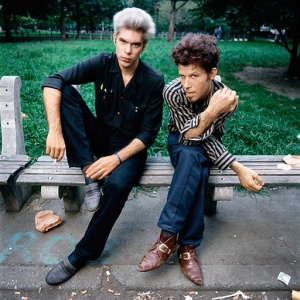
JIM JARMUSCH: Yeah. This was really new for me. Because it’s a mixture of prosthetics and makeup and onset effects; and then obviously, post digital effects. I had amazing people from this company called Chimney they’re in New York and also in, Copenhagen and they are fantastic and they helped a lot. They were on set too trying to, you know, figure this stuff out. But it was daunting because we were really stressed timewise to make this film. So then adding all that in our time seeping away to, to try to figure out how to do it, it was, it was rough honestly. But it was also exciting, especially once you’ve got to post because they brought ideas, like they would do things I wasn’t expecting. Like okay, somebody gets their head chopped off, but they would leave part of an ear and some teeth, they did beautiful things there. And I love the saucer and the texture under it was their idea. It’s got almost this Aztec weird stuff underneath it, on the bottom side. So it was in the end, really fun. But even editing it took a lot of time and a lot of work to okay them and “no this has gotta be this way or I want more dust, less dust.” It was time consuming. I’m not used to that.
PHAWKER: So all the best sort of zombie films have an underlying metaphor. And with this one it’s kind of about the environment with the cause of the zombie apocalypse being about the arctic fracking, and the Earth going off its axis. Everybody in the film reacts to this news nonchalantly, except for the kids, they were the only ones really terrified. What I got from that was like, you really think that generation is basically fucked, with how we’ve left this planet and they are the only ones that really get it.
JIM JARMUSCH: Well they know, they know how dire it is and one of my leaders is Greta Thunberg, 16-year-old Danish girl with Asperger’s. She is leading young people across Europe to be totally aware of this ecological crisis and she’s 16 and has Asperger’s and she will organize. Last weekend she had a kind of pop up rally and I think Copenhagen of 40,000 people and she, she’s just amazing. You know. I love teenagers too in general, because teenagers get shit on, and we were them. So we know that. But they define our sense of fashion, of music, of style, of so many things. They’re kind of leaders for me and that there are a lot of throughout history, that are brilliant, look at, Rimbaud, so many incredible teenagers and in music, forget about it, like Billie Eilish, this pop star, she’s really brilliant, she’s amazing.
But anyway, so to me, those young people who are already in Centerville, they’re already removed from society because they, they had problems, right? They’re in detention, they’re in jail. Right? Then Tom Waits, his character, he’s removed himself from, he’s like, ‘No, I don’t want to be part of this anymore.’ And they’re the only ones that aren’t zombified, you know, they do survive and they also get it. The Waits character too, he’s seeing toxic lunar vibrations. He’s feeling some bad stuff, you know, because he’s tuned into some other rhythms of nature. He’s observing things. These mushrooms shouldn’t be here. The ants are all jacked up. The moon, something toxic going on. Even when he sees the grave he knows right away ‘This is full blown ghouls re-animated zombie shit. No doubt. No question.’ You know his character knows.
PHAWKER: I love the ghouls line because it such a great throwback to older films in the genre.
JIM JARMUSCH: Romero didn’t like calling them zombies either. Apparently more undead or stuff like that.
PHAWKER: Being a fan myself what I was afraid of when I sat down to this was, were you going to be talking down to the audience or were you going to be showing a legitimate love for these films and for the genre? To me it was a love letter to all things horror. I mean you have the Creepy magazines, you had the Eerie magazines. The buttons folks were referencing, people are dropping references. Do you think that is why it’s so divisive to people? Because I guess some people expected you to kind of take these films and be like, oh this is stupid, let me laugh at it and make something super ironic, and instead you’ve kind of embraced it.
JIM JARMUSCH: We were not trying to make a joke out of the genre and, and I think the love for Romero is there, so many references in there layered in, it’s obviously our godmother of our film is Night of the Living Dead. So it’s definitely him celebrating it. You know, I don’t know what they expected? Do people expect me to make a formulaic zombie film? I don’t know. You know, I don’t, I, it’s not really my rhythm. I don’t know what to do. I’ve just followed my instincts, but it was definitely not trying to talk down to it. And as far as the meta stuff, you know, I wrote that to amuse myself while writing the script.
So I thought, when I get with Adam and Bill, I’m going to see how they react and what do they think about this before we shoot, you know? And they were like, ‘Oh yeah, we like this, this is good.’ So I kept it, but I could have easily jettisoned it if they said it’s a little arch or this is too self-referential. But they really loved it and they’re my collaborators for that. So I thought, okay, I leave that in there. It wasn’t really a master plan as much as just trying to make myself laugh while writing it, you know?
PHAWKER: Yeah, I loved just a lot of the little like nods like I mean the most obvious was Adam Driver’s Star Destroyer keychain and I do love seeing Adam Driver get out of out of a tiny smart car, cause he’s a big dude.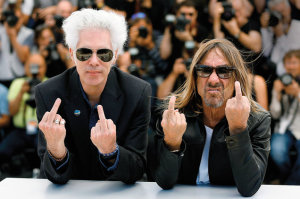
JIM JARMUSCH: He’s a big dude, and I saw a smart car when I was writing it, a convertible on the street and I was like come on, I got to see Adam Driver driving convertible smart car. That’s really funny.
PHAWKER: You said it was a collaborative effort, but was there anybody that said maybe this project is too weird for me? The ensemble was reminiscent of a jam band with all of your favorite musicians in it and everyone seemed like they were genuinely having the time of their life in it.
JIM JARMUSCH: Well, it’s a character film for me. Centerville has these characters, which is also a little different for me, because usually I have several central characters that the story, they go through the story and they encounter others. But this, I jumped around, but nobody had any problem.
My first concern really was, cause I wrote it for Adam, Bill, Chloe, for Tilda, for Steve Buscemi, but Chloe, and Steve, I had to tell them. I’ve known Chloe a long time, I’m like, this is not a feminist character. This is a female character who screams and gets upset, she’s like, okay, cool. That’s okay. It’s a kind of an archetype or a caricature to a degree. And Steve is one of the least bigoted, kindest people I know. So, to make him a racist, I had to say is this cool with you Steve? And he’s like, ‘yeah, no, I got it. Yeah, this is good. I’ll do it.’ You know? So those were my only concerns and they were fine.
PHAWKER: Chloe was great in it. I love her little reactions to everything because you don’t see her do a lot of stuff like that.
JIM JARMUSCH: She was just game for it. I don’t know, I’m still pinching myself, they all agreed to do it. I don’t know how I got all these wonderful, incredible people.
PHAWKER: There was a thing going around the Internet about Adam Driver being named Peterson in this movie is an allusion to Patterson.
JIM JARMUSCH: Well I also amused myself. Bill Murray, in Broken Flowers was named Don Johnson this time around he’s named Cliff Roberts. Rosie Perez is Posie Juarez. Tilda Swinton is named Zelda Winston, you know, so I was doing a lot of that just to have fun while I was writing. So there’s a lot of that stuff too.
Peterson [comes from] always teasing Adam while we were shooting Patterson. I teased him relentlessly about, you know, ‘The next one we’re doing is called Peterson and you are a psychopathic, murderous, bus driving fucking nihilistic with a 357.’ And the tagline is, ‘Get off my fucking bus!’ or ‘Next Stop Hell.’ You know, I would give him all this stuff and he was like, ‘Okay Peterson.’ Cause I love making Adam Driver laugh. I don’t know why. He’s just so great and he’s very dry, you know, has a really good sense of humor. But you’ve got to kind of work at it. But I love trying to make him laugh. So that’s where Peterson came from.
PHAWKER: So the dialogue for me in all your films has an almost lyrical quality to it. Is it harder for you to write scripts or to write a song?
JIM JARMUSCH: Oh Gosh. Probably harder for me to write a song, but I do write songs too, a little bit. So the thing about it is when I’m writing a script and I have the characters in my head, very often, when it’s working well, I’m just channeling and basically I’m just transcribing what they’re saying in my head. I’m not thinking about it, which is weird. Like they’ll start talking and I’m like, ‘Oh shit, I gotta write it down.’ But they’re already alive and I’m not really creating it. It’s a weird thing, you know?
But I know a lot of songwriters, so like both Tom Waits and Neil Young have told me it’s like, ‘Oh shit, ones coming, I got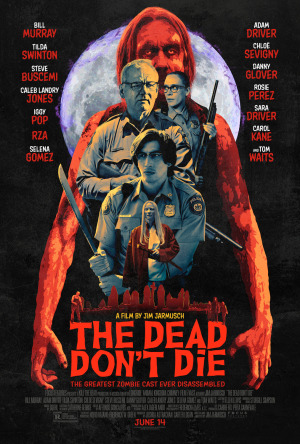 to go!’ They don’t know when it’s going to come or what it is. It’s very mysterious. But I love when I’m writing dialogue and suddenly I’m just transcribing and that doesn’t always happen. But when it does, man, it feels so interesting to me. It’s very mysterious.
to go!’ They don’t know when it’s going to come or what it is. It’s very mysterious. But I love when I’m writing dialogue and suddenly I’m just transcribing and that doesn’t always happen. But when it does, man, it feels so interesting to me. It’s very mysterious.
PHAWKER: Speaking of dialog in The Dead Don’t Die I love RZA’s line ‘The world is perfect, appreciate the details.’ It just really hit me and was super profound given the film.
JIM JARMUSCH: Well it comes from the fact that RZA is a very philosophical and even on Instagram and stuff, he will drop wisdom, that’s very helpful. Always positive and always has strength, you know? So I thought, okay, for RZA I gotta write something very simple and I liked, I like appreciate, I like the world is perfect right now. It is, if you’re in the present moment, the world is perfect and if you appreciate the details, and I need that because I do get very depressed by human behavior. And especially this denial of an ecological crisis, it’s the denial of it gets me really upset, its painful to me.
The positive side is when I get depressed, I think about life on Earth, being so in the universe, so ephemeral, so brief that we have consciousness, that we’re here. Look, it’s like orchids, you know, we’re here, we’re talking about stuff we like, you know, it’s incredible to me. So, and it could be gone like that. So then I think, okay, you gotta appreciate your consciousness. It’s really a beautiful thing. No matter how, if the end of the world was raining down on us, the fact that we were feeling it or witnessing it would be almost ecstatic in a weird way. I love John Cage and for many reasons, but he was a Buddhist and he once said, ‘Don’t try to change things, you’ll only make them worse,’ which I always thought was maddening, frustrating, and very beautiful and wise, too. So I don’t know. But I do think we have this consciousness and the world is perfect in a way, you know? So, I tried to appreciate the details.
PHAWKER: When was the last time you watched Stranger Than Paradise? Did it hold up for you? It’s regarded by most of your acolytes as just about perfect, but I’m wondering if when you watch it now there’s some minor detail that you never felt you got right and it continues to bother you to this day? Have you ever considered revisiting these characters 40 years later?
JIM JARMUSCH: My only revisiting was to have Eszter Balint in The Dead Don’t Die, who I hadn’t worked with in forever and was like 17 when we shot Stranger. No. I have a rule I see my films once with an audience that paid to see it in a theater and they don’t know I am there. But before that I will see it at a festival or whatever screening for Q&A and then never ever again. So even if I have to do a new transfer of the film, in the old days I would say take the reels and put them out of order and no sound. Now I say I will look at the image and then the sound. Don’t put them together. I don’t want to see it as a film ever again.
PHAWKER: How would you do a director’s commentary?
JIM JARMUSCH: I wouldn’t. I insist on having emailed questions come into me and then I answer them independently of the image.
PHAWKER: Is that because you would want to possibly want to tinker with this finished product?
JIM JARMUSCH: It’s two things. I can’t change it. So if I see flaws in it, too late. So that’s just going to aggravate me. Two, more importantly, I don’t like looking back, generally in life. I like going forward. I like the person that when their asked what their favorite film is, it’s the next one! I just don’t like going backwards.
PHAWKER: So, you wouldn’t want to revisit these characters?
JIM JARMUSCH: No, but we want to do a TV thing with Ghost Dog. RZA, Forrest and I have been trying to get that going and we don’t care our involvement could be executive producers even, we would like to give it over and there is a great script for a pilot. But I wouldn’t revisit the film per se. Some people like that, though. Robert Altman loved to revisit his films, so for him healthy, for me unhealthy.
PHAWKER: Lastly, loved your Stooges doc, Gimme Danger. What are some of your favorite Stooges songs because music plays such a large role in your filmography?
JIM JARMUSCH: Oh man, that’s really rough. I think “Gimme Danger” is a beautiful song, the lyrics are fantastic, it’s one of my favorites. But I like “We Will Fall,” some of the odd ones off the first record. I think everything off Funhouse is a masterpiece. I think that is one of the greatest rock and roll albums ever made. So, I would go for anything on that. But I don’t know I am a big Stooges fan, so it’s hard to choose.
PHAWKER: It was hilarious to see Iggy in the film and he looked actually like pretty normal, just like Iggy.
JIM JARMUSCH: Well Iggy wanted to know how he died, before he was a zombie? What was I exactly? I said in 1973 you were coming home from a Blue Oyster Cult concert on a motorcycle, you crashed and died and he was like “cool, I got it!”

